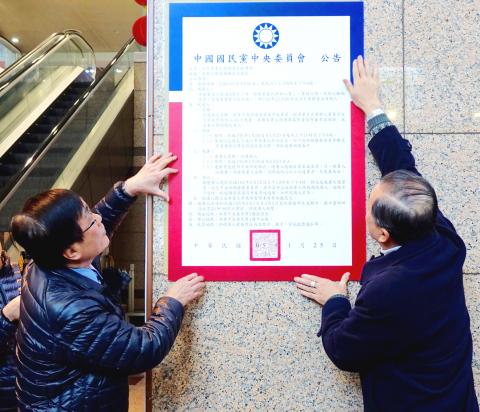Deputy Legislative Speaker Hung Hsiu-chu (洪秀柱) yesterday dismissed speculation that some Chinese Nationalist Party (KMT) legislators might quit the party if she wins the chairmanship by-election.
“Since a party chairperson is elected with the support of a majority of party members, it means that most members agree with that person’s ideas and have decided to let that person take the party helm,” Hung said in Taipei, when asked to comment on the reports.
Hung, who has been branded a champion of rapid unification due to her “one China, same interpretation” proposal, said the only explanation is that people who differ in their ways simply cannot take counsel with each other.

Photo: Chien Jung-feng, Taipei Times
Hung made the remarks after meeting with members of a newly formed alliance called the Structure Defenders” (制度者聯盟).
Established yesterday by scores of KMT representatives and Central Committee members, the alliance has seven aims: holding a debate on the KMT’s future policy direction, revitalizing the KMT’s young forces, establishing a bottom-up policymaking mechanism, cultivating young talent, ensuring transparency of party assets, strengthening ties with people at the grassroots level, as well as lowering thresholds for party chairman election and holding a televised debate and policy presentation among candidates.
Hung said she is willing to participate in a debate on the KMT’s future direction, but it is up to each and every party member to decide to whom they aspire to entrust their party.
As for continued concerns within the KMT about her cross-strait stance, Hung said she is the one to blame because she has failed to elucidate her policies.
“I will surely explain them in the future, but not now,” she said.
KMT Legislator Apollo Chen (陳學聖), who won re-election in the Jan. 16 polls, yesterday threw his hat in the bid for party chairperson, saying his decision was prompted by three reasons.
“First, only a handful of the KMT’s middle-aged members managed to secure victory in the recent elections. As one of them, I cannot sit back and watch while the KMT faces its most difficult time,” Chen said.
The 58-year-old said he also wanted to help the KMT determine the causes of its landslide defeat and create a bottom-up democratic mechanism within the party.
Chen said he had consulted with many peers before making his decision, including former KMT chairman Eric Chu (朱立倫), but declined to reveal whether Vice President Wu Den-yih (吳敦義), who is reportedly interested in vying for the position, was one of them.
Chen is the fifth KMT member to join the by-election, after Hung, former KMT vice chairman Hau Lung-bin (郝龍斌), as well as Taipei City councilors Lee Hsin (李新) and Chung Hsiao-ping (鍾小平).
According to KMT headquarters’ schedules for the by-election, which is planned for March 26, applicants can pick up registration forms for the election today and tomorrow.
They also have to collect signatures from at least 3 percent of all party members between today and Feb. 21 before they can officially register their candidacy on Feb. 22.
See STORIES on page 8

SECURITY: As China is ‘reshaping’ Hong Kong’s population, Taiwan must raise the eligibility threshold for applications from Hong Kongers, Chiu Chui-cheng said When Hong Kong and Macau citizens apply for residency in Taiwan, it would be under a new category that includes a “national security observation period,” Mainland Affairs Council (MAC) Minister Chiu Chui-cheng (邱垂正) said yesterday. President William Lai (賴清德) on March 13 announced 17 strategies to counter China’s aggression toward Taiwan, including incorporating national security considerations into the review process for residency applications from Hong Kong and Macau citizens. The situation in Hong Kong is constantly changing, Chiu said to media yesterday on the sidelines of the Taipei Technology Run hosted by the Taipei Neihu Technology Park Development Association. With

CARROT AND STICK: While unrelenting in its military threats, China attracted nearly 40,000 Taiwanese to over 400 business events last year Nearly 40,000 Taiwanese last year joined industry events in China, such as conferences and trade fairs, supported by the Chinese government, a study showed yesterday, as Beijing ramps up a charm offensive toward Taipei alongside military pressure. China has long taken a carrot-and-stick approach to Taiwan, threatening it with the prospect of military action while reaching out to those it believes are amenable to Beijing’s point of view. Taiwanese security officials are wary of what they see as Beijing’s influence campaigns to sway public opinion after Taipei and Beijing gradually resumed travel links halted by the COVID-19 pandemic, but the scale of

A US Marine Corps regiment equipped with Naval Strike Missiles (NSM) is set to participate in the upcoming Balikatan 25 exercise in the Luzon Strait, marking the system’s first-ever deployment in the Philippines. US and Philippine officials have separately confirmed that the Navy Marine Expeditionary Ship Interdiction System (NMESIS) — the mobile launch platform for the Naval Strike Missile — would take part in the joint exercise. The missiles are being deployed to “a strategic first island chain chokepoint” in the waters between Taiwan proper and the Philippines, US-based Naval News reported. “The Luzon Strait and Bashi Channel represent a critical access

Pope Francis is be laid to rest on Saturday after lying in state for three days in St Peter’s Basilica, where the faithful are expected to flock to pay their respects to history’s first Latin American pontiff. The cardinals met yesterday in the Vatican’s synod hall to chart the next steps before a conclave begins to choose Francis’ successor, as condolences poured in from around the world. According to current norms, the conclave must begin between May 5 and 10. The cardinals set the funeral for Saturday at 10am in St Peter’s Square, to be celebrated by the dean of the College